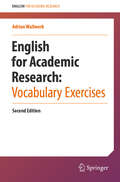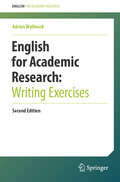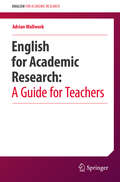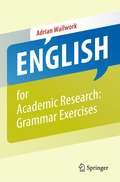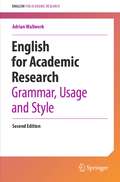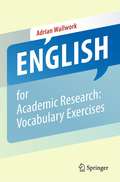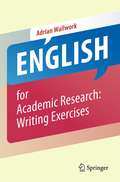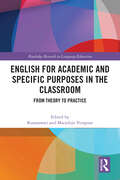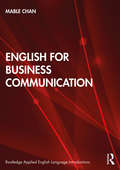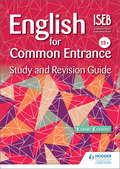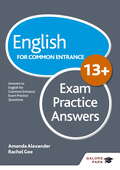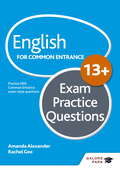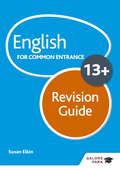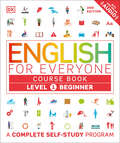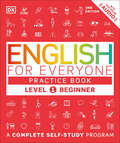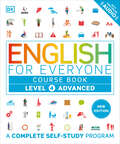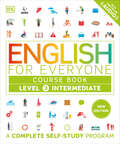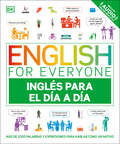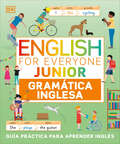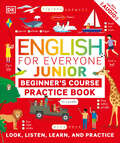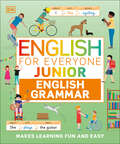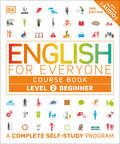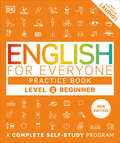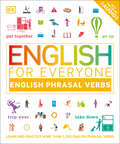- Table View
- List View
English for Academic Research: Vocabulary Exercises (English for Academic Research)
by Adrian WallworkThis book is based on a study of referees' reports and letters from journal editors on reasons why papers written by non-native researchers are rejected due to problems with English (long sentences, redundancy, poor structure etc.). It draws on English-related errors from around 5000 papers written by non-native authors, around 3000 emails, 500 abstracts by PhD students, and over 1500 hours of teaching researchers how to write and present research papers. The exercises are organized into thirteen chapters on: adjectives and adverbs (e.g. actual vs current, different vs several, continually vs continuously), link words (e.g. on the contrary vs on the other hand, despite vs nevertheless), nouns (e.g. danger vs hazard, measure vs measurement), prepositions (e.g. among vs between, in vs into, with vs within), verbs (e.g. check vs control, compose vs comprise, arise vs raise, exclude vs rule out), false friends and synonyms, spelling, useful phrases, inclusive vocabulary, emails, using Large Language Models for correcting, paraphrasing, and translating.Nearly all exercises require no actual writing but simply choosing between various options, thus facilitating self-study, e-reading and rapid progress.The exercises can also be integrated into English for Academic Purposes (EAP) and English for Special Purposes (ESP) courses at universities and research institutes.The book can be used in conjunction with the other exercise books in the series:English for Academic Research: Writing ExercisesEnglish for Academic Research: Grammar ExercisesAdrian Wallwork edits scientific papers and teaches English for Academic Purposes (EAP) to PhD students. In addition to his many books for Springer, he has written course books for Oxford University Press and discussion books for Cambridge University Press.
English for Academic Research: Writing Exercises (English for Academic Research)
by Adrian WallworkThis book is based on a study of referees' reports and letters from journal editors on reasons why papers written by non-native researchers are rejected due to problems with English (long sentences, redundancy, poor structure etc.).The exercises in this new edition are organized into twelve chapters on: punctuation and spellingword orderwriting short sentences and paragraphslink words - connecting phrases and sentences togetherbeing concise and removing redundancyambiguity and political correctnessparaphrasing and avoiding plagiarismdefining, comparing, evaluating and highlightinganticipating possible objections, indicating level of certainty, discussing limitations, hedging, future workusing Large Language Models for writing papers, emails and presentation scriptsSome exercises require no actual writing but simply choosing between various options. In those exercises where extended writing is required, model answers are given.The exercises can also be integrated into English for Academic Purposes (EAP) and English for Special Purposes (ESP) courses at universities and research institutes.The book can be used in conjunction with the other exercise books in the series and is cross-referenced to:English for Research: Usage, Style, and Grammar English for Writing Research PapersEnglish for Academic Research: Grammar Exercises English for Academic Research: Teacher’s GuideAdrian Wallwork edits scientific papers and teaches English for Academic Purposes (EAP) to PhD students. In addition to his many books for Springer, he has written course books for Oxford University Press and discussion books for Cambridge University Press.
English for Academic Research: A Guide for Teachers
by Adrian WallworkScientific English is possibly the most rewarding area of EFL teaching. It differs from English for Academic Purposes (EAP) as it is directed to a much smaller audience: PhD and postdoc students. Courses on Scientific English are held in universities throughout the world, yet there is very little support for teachers in understanding what to teach and how to teach it. This guide is part of the English for Academic Research series. Part 1 of the book sheds light on the world of academia, the writing of research papers, and the role of journal editors and reviewers. Part 2 gives practical suggestions on how to help your students improve their presentation skills. In Part 3 you will learn how to teach academic skills using nonacademic examples. Parts 1-3 are thus useful for anyone involved in teaching academic English, whether they have used the other books in the series or not. Part 4 suggests two syllabuses for teaching writing and presenting skills, based on the two core books: English for Writing Research Papers English for Presentations at International Conferences This book will help you i) understand the world of your students (i. e. academic research), ii) plan courses, and iii) exploit the What's the Buzz? sections in the books on Writing, Presentations, Correspondence and Interacting on Campus. Adrian Wallwork has written over 30 books covering General English (Cambridge University Press, Scholastic), Business English (Oxford University Press), and Scientific English (Springer). He has trained several thousand PhD students from all over the world to write and present their research. Adrian also runs a scientific editing service: English for Academics (E4AC).
English for Academic Research: Grammar Exercises
by Adrian WallworkThis book is based on a study of referees' reports and letters from journal editors on reasons why papers written by non-native researchers are rejected due to problems with English grammar. It draws on English-related errors from around 5000 papers written by non-native authors, several hundred emails, 500 abstracts by PhD students, and over 1000 hours of teaching researchers how to write and present research papers. The exercises include the following areas: active vs passive, use of wearticles (a/an, the, zero) and quantifiers (some, any, few etc)conditionals and modalscountable and uncountable nounsgenitiveinfinitive vs -ing formnumbers, acronyms, abbreviationsrelative clauses and which vs thattenses (e.g. simple present, simple past, present perfect)word orderExercise types are repeated for different contexts. For example, the difference between the simple present, present perfect and simple past is tested for use in papers, referees' reports, and emails of various types. Such repetition of similar types of exercises is perfect for revision purposes. English for Academic Research: Grammar Exercises is designed for self-study and there is a key to all exercises. Most exercises require no actual writing but simply choosing between various options, thus facilitating e-reading and rapid progress. The exercises can also be integrated into English for Academic Purposes (EAP) and English for Special Purposes (ESP) courses at universities and research institutes. The book can be used in conjunction with the other exercise books in the series and is cross-referenced to: English for Research: Usage, Style, and GrammarEnglish for Writing Research PapersEnglish for Academic Correspondence and Socializing Adrian Wallwork is the author of around 30 ELT and EAP textbooks. He has trained several thousand PhD students from 35 countries to write and present academic work. English for Writing Research PapersEnglish for Academic Correspondence and Socializing Adrian Wallwork is the author of around 30 ELT and EAP textbooks. He has trained several thousand PhD students from 35 countries to write and present academic work. English for Academic Correspondence and Socializing Adrian Wallwork is the author of around 30 ELT and EAP textbooks. He has trained several thousand PhD students from 35 countries to write and present academic work.
English for Academic Research: Grammar, Usage and Style (English for Academic Research)
by Adrian WallworkThis guide draws on English-related errors from around 6000 papers written by non-native authors, 500 abstracts written by PhD students, and over 2000 hours of teaching researchers how to write and present research papers. This new edition has chapters on exploiting AI tools such as ChatGPT, Google Translate, and Reverso, for generating, paraphrasing, translating and correcting texts written in English. It also deals with contemporary issues such as the use of gender pronouns. Due to its focus on the specific errors that repeatedly appear in papers written by non-native authors, this manual is an ideal study guide for use in universities and research institutes. Such errors are related to the usage of articles, countable vs. uncountable nouns, tenses, modal verbs, active vs. passive form, relative clauses, infinitive vs. -ing form, the genitive, link words, quantifiers, word order, prepositions, acronyms, abbreviations, numbers and measurements, punctuation, and spelling. Other titles in this series: Grammar, Vocabulary, and Writing Exercises (three volumes) 100 Tips to Avoid Mistakes in Academic Writing and Presenting English for Writing Research Papers English for Presentations at International Conferences English for Academic Correspondence English for Interacting on Campus English for Academic CVs, Resumes, and Online Profiles English for Academic Research: A Guide for Teachers Adrian Wallwork is the author of more than 40 English Language Teaching (ELT) and English for Academic Purposes (EAP) textbooks. He has trained several thousand PhD students and researchers from 50 countries to write papers and give presentations. He edits research manuscripts through his own proofreading and editing service.
English for Academic Research: Vocabulary Exercises
by Adrian WallworkThis book is based on a study of referees' reports and letters from journal editors on reasons why papers written by non-native researchers are rejected due to problems with English (long sentences, redundancy, poor structure etc). It draws on English-related errors from around 5000 papers written by non-native authors, around 3000 emails, 500 abstracts by PhD students, and over 1000 hours of teaching researchers how to write and present research papers. The exercises are organized into nine chapters on: adjectives and adverbs (e.g. actual vs current, different vs several, continually vs continuously), link words (e.g. on the contrary vs on the other hand, despite vs nevertheless), nouns (e.g. danger vs hazard, measure vs measurement), prepositions (e.g. among vs between, in vs into, with vs within), verbs (e.g. check vs control, compose vs comprise, arise vs raise, exclude vs rule out), false friends and synonyms, spelling, useful phrases, emails Nearly all exercises require no actual writing but simply choosing between various options, thus facilitating self-study, e-reading and rapid progress. The exercises can also be integrated into English for Academic Purposes (EAP) and English for Special Purposes (ESP) courses at universities and research institutes. The book can be used in conjunction with the other exercise books in the series: English for Academic Research: Writing Exercises English for Academic Research: Grammar Exercises
English for Academic Research: Writing Exercises
by Adrian WallworkThis book is based on a study of referees' reports and letters from journal editors on reasons why papers written by non-native researchers are rejected due to problems with English (long sentences, redundancy, poor structure etc). It draws on English-related errors from around 5000 papers written by non-native authors, around 3000 emails, 500 abstracts by PhD students, and over 1000 hours of teaching researchers how to write and present research papers. The exercises are organized into ten chapters on: punctuation and spellingword orderwriting short sentences and paragraphslink words - connecting phrases and sentences togetherbeing concise and removing redundancyambiguity and political correctnessparaphrasing and avoiding plagiarismdefining, comparing, evaluating and highlightinganticipating possible objections, indicating level of certainty, discussion limitations, hedging, future workwriting each section of a paperSome exercises require no actual writing but simply choosing between various options, thus facilitating self-study, e-reading and rapid progress. In those exercises where extended writing is required, model answers are given. Exercise types are repeated for different contexts, for example the importance of being concise is tested for use in papers, referees' reports, and emails of various types. Such repetition of similar types of exercises is designed to facilitate revision. The exercises can also be integrated into English for Academic Purposes (EAP) and English for Special Purposes (ESP) courses at universities and research institutes. The book can be used in conjunction with the other exercise books in the series and is cross-referenced to: English for Research: Usage, Style, and Grammar English for Writing Research Papers
English for Academic and Specific Purposes in the Classroom: From Theory to Practice (Routledge Research in Language Education)
by Rosmawati Marjolijn VerspoorThis volume showcases curriculum designs, instructional strategies, classroom challenges, and assessment practices in courses around the world introduced to meet the demand for English language skills for academic (EAP) or specific purposes (ESP) in higher education settings. Particularly in English as a medium of instruction (EMI) institutions, the courses are frequently part of the curriculum, regardless of discipline or specialization. Given the prevalence of such courses, it is important to understand how they are implemented.Many theories and models have inspired and underpinned these courses, including genre-based instruction, Writing in the Disciplines, Systemic Functional Linguistics, the academic literacies model, and translanguaging. Often, these are combined with various pedagogical approaches such as constructive alignment, flipped learning, learning-oriented assessment, Galperin’s theory of Systematic Formation of Mental Actions (SFMA), the study skills models, pedagogical cultural-historical activity theory, and the TESOL teaching-learning cycle. This book showcases how these are implemented in EAP/ESP classrooms.This volume gives a voice to instructors whose experience in real-life classrooms is invaluable to inform research and policies as well as to refine theories. It serves as a venue for conversation among the community of practitioners and researchers of applied linguistics and language teaching.
English for Business Communication (Routledge Applied English Language Introductions)
by Mable ChanThis textbook provides a comprehensive introduction for students and professionals who are studying English for business or workplace communication and covers both spoken and written English. Based on up-to-date research in business communication and incorporating an international range of real-world authentic texts, this book deals with the realities of communication in business today. Key features of this book include: use of English in social media that reflects recent trends in business communication; coverage of the concept of communicative competence; analysis of email communication; introduction to informal English and English for socialisation as well as goodwill messages, such as thank you or appreciation messages, which are a part of everyday interaction in the workplace; examination of persuasive messages and ways to understand such messages; an e-resources website that includes authentic examples of different workplace genres and a reference section covering relevant research studies and weblinks for readers to better understand the topics covered in each chapter. This book goes beyond the traditional coverage of business English to provide a broad and practical textbook for those studying English in a workplace setting.
English for Common Entrance Study and Revision Guide
by Kornel KossuthSucceed in the exam with this revision guide, designed specifically for the brand new Common Entrance English syllabus. It breaks down the content into manageable and straightforward chunks with easy-to-use, step-by-step instructions that should take away the fear of CE and guide you through all aspects of the exam.- Gives you step-by-step guidance on how to recognise various types of comprehension questions and answer them- Shows you how to write creatively as well as for a purpose for the section B questions- Reinforces and consolidates learning with tips, guidance and exercises throughout - Makes it easy to navigate and find specific revision topics with short, clear sections
English for Common Entrance at 13+ Exam Practice Answers (for the June 2022 exams)
by Amanda Alexander Rachel GeePlease note, this resource is suitable for the exams up to June 2022. New revision resources will be available from Spring 2022 for the exams from November 2022.Exam Board: ISEBLevel: 13+Subject: EnglishFirst Teaching: September 2012First Exam: Autumn 2013This book contains answers to all the questions in English for Common Entrance at 13+ Exam Practice Questions, accompanied with extensive advice and guidance to help achieve top marks.- Endorsed by Independent School Examination Board (ISEB)- Clean, clear layout for easy marking- Identifies areas requiring further attentionAlso available in the English for Common Entrance at 13+ range:- English for Common Entrance at 13+ Revision Guide (ISBN: 9781471875021)- English for Common Entrance at 13+ Exam Practice Questions (ISBN: 9781471868962)
English for Common Entrance at 13+ Exam Practice Questions (for the June 2022 exams)
by Amanda Alexander Rachel GeePlease note, this resource is suitable for the exams up to June 2022. New revision resources will be available from Spring 2022 for the exams from November 2022.Exam Board: ISEBLevel: 13+Subject: EnglishFirst Teaching: September 2012First Exam: Autumn 2013This book provides a wealth of comprehensive practice exercises in the format of the ISEB Common Entrance exam at both Level 1 and 2. A varied selection of texts and poems has been selected to help pupils for the Reading sections of the exam, and there is a large bank of exercises for the Writing sections.Exam Practice Answers is available to accompany this title.- Endorsed by Independent School Examination Board (ISEB)- Features rigorous and realistic exam-style questions in the style of the ISEB Common Entrance exam - Provides extensive practice and guidance to help pupils achieve top marksAlso available in the English for Common Entrance at 13+ range:- English for Common Entrance 13+ Revision Guide (ISBN: 9781471875021)- English for Common Entrance Exam Practice Answers (ISBN: 9781471868993)
English for Common Entrance at 13+ Revision Guide (for the June 2022 exams)
by Susan ElkinPlease note, this resource is suitable for the exams up to June 2022. New revision resources will be available from Spring 2022 for the exams from November 2022.Exam Board: ISEBLevel: 13+Subject: EnglishFirst Teaching: September 2012First Exam: Autumn 2013An essential revision resource for pupils working towards English Common Entrance at 13+. A full colour resource which holds the most up-to-date material and exam techniques. Throughout the book you will find revision tips and practical guidance on how to achieve top grades, as well as self- assessment questions to help pupils identify areas that need further study.- Endorsed by Independent School Examination Board (ISEB)- Consolidates all the key information required for Common Entrance at 13+- Provides practical guidance on improving written answers and exam technique- Includes advice on creative writing and how to write for practical purposes
English for Ethiopia Grade 7
by Wagaba William Tarekegn Mekonnen Fekadu Mulugeta Tindikahwa EdwardEnglish for Ethiopia Gread 7 Students Text Book
English for Everyone - Level 1 Beginner's Course Book (DK English for Everyone)
by DKPLEASE NOTE - this is a replica of the print book and you will need paper and a pencil to complete the exercises.This essential guide to English will ensure you're speaking the same language in no time.Get started with the ultimate self-study course that is easy to use and quick to learn. This beginner's book guarantees an engaging and entertaining experience for adults learning English as a foreign language.From introducing yourself and talking about your life and interests to expanding your vocabulary and understanding grammar rules, this is a completely comprehensive introduction to the English language. A range of listening, speaking, reading, and writing exercises are presented in a simple, fluid format with an attractive visual style and accessible text. As you grow in confidence, you'll soon be moving through the levels to reach advanced English.This book is part of DK's best-selling English for Everyone series, which is suitable for all levels of English language learners and provides the perfect reading companion for study, exams (including TOEFL and IELTS), work, or travel. With audio material available on the accompanying English For Everyone website and Android/iOS apps bringing vital experience of spoken English, there has never been a better time to learn the world's second most popular language.
English for Everyone - Level 1 Beginner's Practice Book (DK English for Everyone)
by DKPLEASE NOTE - this is a replica of the print book and you will need paper and a pencil to complete the exercises.Practice makes perfect with this exciting guide to learning English.Work your way up with the ultimate self-study course that is easy to use and quick to learn. This practice book is perfect for anyone just starting to learn English, as well as those with a little English knowledge. It has a huge variety of bite-size, attractively presented exercises to drill the language skills taught in English for Everyone Course Book: Level 1 Beginner. Hundreds of activities and accompanying audio cover listening, speaking, reading, and writing to reinforce language skills.You'll expand your English vocabulary with topics like introducing yourself, your job, and hobbies and interests. Get to grips with grammar rules, including using apostrophes and linking sentences, and perfect your pronunciation with audio exercises by native speakers. Eye-catching illustrations and step-by-step explanations keep content simple and straightforward for easy learning.English for Everyone Level 1Beginner's Practice Book is part of DK's best-selling English for Everyone series. It is suitable for all levels of English-language learners and provides the perfect reading companion for study, exams, work, or travel. With audio material available on the accompanying website and Android/iOS app, there has never been a better time to learn English.
English for Everyone Course Book Level 4 Advanced: A Complete Self-Study Program (DK English for Everyone)
by DKTake your self-study English language learning a step further with the fourth book in the easy-to-use, visual learning series.English for Everyone Level Course Book Level 4 Advanced is a complete self-study English language course for intermediate learners. The content is more challenging at this level, covering subjects such as family life, business, news, and media.This advanced course targets experienced English speakers looking to sharpen their existing skills. English is taught at the highest level by reinforcing key language skills, grammar rules, and vocabulary with listening, speaking, reading and writing exercises. Extensive audio materials support all teaching, with clips recorded by native English speakers to teach the perfect pronunciation.Immerse yourself in this practical ESL learning material, which includes: A new and updated edition from the bestselling English for Everyone series, with nearly 3 million copies sold in over 90 countries.A brand new 8-page grammar reference section to put new language into practice.Extensive accompanying audio resources that can be accessed via the website and the app. This book is part of DK's best-selling English for Everyone series, which is suitable for all levels of English language learners and provides the perfect reading companion for study, exams, work, or travel. As you work through the units, you'll cover all the language skills, vocabulary, and grammar needed for the major global English-language exams, including TOEFL and IELTS.
English for Everyone Course Book Level 3 Intermediate (DK English for Everyone)
by DKTake your self-study English language learning a step further with the third book in the easy-to-use, visual learning series.English for Everyone Level Course Book Level 3 Intermediate is a complete self-study English language course for intermediate learners. It introduces topics such as telling a story, describing new experiences, relationships, and problem-solving.This course book has eye-catching illustrations and step-by-step explanations, keeping content straightforward for easy learning. Packed with listening, speaking, reading, and writing exercises presented in bite-sized modules, you can follow the book from start to finish or dip in and out to boost your language skills. All teaching is supported by extensive audio materials, with clips recorded by native English speakers to teach the perfect pronunciation.Immerse yourself in this practical ESL learning material, which includes: A new and updated edition from the bestselling English for Everyone series, with nearly 3 million copies sold in over 90 countries.A brand new 8-page grammar reference section to put new language into practice.Extensive accompanying audio resources that can be accessed via the website and the app. This book is part of DK's best-selling English for Everyone series, which is suitable for all levels of English language learners and provides the perfect reading companion for study, exams, work, or travel. As you work through the units, you'll cover all the language skills, vocabulary, and grammar needed for the major global English-language exams, including TOEFL and IELTS.
English for Everyone Inglés para el día a día (DK English for Everyone)
by DK¡Lleva tus habilidades de comunicación en inglés a otro nivel! Si necesitas aprender inglés para trabajar, estudiar, viajar o incluso mudarte, este libro será tu mayor aliado.English for Everyone: Everyday English te ayuda a expresarte en inglés en tu día a día con confianza. Aprende a comunicarte en diferentes escenarios del mundo real, desde actividades como ir al supermercado, pedir comida a domicilio o concertar citas, hasta conversaciones clave como consolar a alguien o lidiar con un conflicto.En las páginas de este libro de inglés para jóvenes y adultos, encontrarás: Más de 1500 frases y expresiones útiles para practicar tu inglés.Cada unidad incluye diálogos realistas y fáciles de memorizar.Ejercicios prácticos para reforzar el vocabulario y las frases que has aprendido en cada tema.Atractivas imágenes que acompañan los diferentes diálogos.Vídeos y audios de hablantes de inglés nativos, disponibles en nuestra página web y aplicación gratuitas.Una excelente herramienta de apoyo tanto para estudiantes que están preparando sus exámenes oficiales TOEFL, IELTS y TOEIC, como para viajeros o profesores. Mejora tu inglés oral de forma amena y divertida y enfréntate a situaciones cotidianas, como charlas en la oficina o reservas de viajes, más fácilmente. La colección English for Everyone de DK es una forma fácil y divertida de aprender inglés. Con audios de apoyo e innovadores ejercicios que cubren todos los aspectos clave del idioma, estos libros ilustrados sustituyen complicadas explicaciones por imágenes y gráficos claros, para aprender visualmente y que la gramática y el vocabulario resulten fáciles de recordar. ¡Aprender inglés no ha sido nunca tan fácil!Speak English with confidence in a wide range of everyday situations, from making small talk to booking a trip abroad. With more than 1,500 of the most useful phrases and common expressions, English for Everyone: Everyday English gives you all the English conversation skills you need to get by in the real world.This engaging and accessible book covers a wide range of real-life topics and scenarios – from everyday activities, such as going to the supermarket and making appointments, to key communication skills, such as comforting someone and dealing with conflict. You’ll learn how to welcome visitors, ask for directions, give a presentation at work, find somewhere to live, order a meal out, and much, much more.Each short unit uses memorable, true-to-life dialogues to introduce a new topic, followed by practice exercises to reinforce the new words and phrases that you have learned. The dialogues are accompanied by attractive illustrations and brought to life by animated videos and audio featuring speakers of English as a first language, all available on the free English for Everyone website and app. Whether you need to learn English for work, study, travel, or relocation, English for Everyone: Everyday English is the perfect companion to help you take your English skills to the next level.
English for Everyone Junior Gramática inglesa (DK English for Everyone Junior)
by DKAyuda a los niños a aprender las reglas de la gramática inglesa con este divertido libro ilustrado.Esta guía de gramática incluye ilustraciones atractivas, diseños claros y explicaciones sencillas de las reglas del inglés redactadas de una manera fácil de entender para niños de 5 a 9 años. Cada regla gramatical va acompañada de una explicación sencilla que servirá tanto a padres como a profesores a la hora de ofrecerles apoyo a los niños. Además, muestra a través de ilustraciones escenarios del día a día para que los pequeños estudiantes vean la aplicabilidad del contenido.En su interior, encontrarás:-Gramática básica para niños que comenzaron a estudiar inglés recientemente, como los tiempos verbales, oraciones afirmativas, negativas o interrogativas, verbos modales, pronombres y adjetivos.-Las estructuras gramaticales y lingüísticas que necesitan aprender para la preparación de los exámenes Cambridge Young Learners o los grados 1, 2 y 3 de los exámenes Trinity GESE-Módulos cortos, explicaciones sencillas y bonitas ilustraciones que hacen que la gramática sea fácil de entender.El enfoque visual y dinámico de English for Everyone Junior: English Grammar sin duda cautivará a los estudiantes más jóvenes, ¡y se convertirá en su compañero de estudio ideal! Acompañales a descubrir el mundo que los rodea, a hablar sobre lo que les gusta y lo que no, a hacer preguntas, a formar oraciones negativas ¡y mucho másLa colección English for Everyone de DK es una forma fácil y divertida de aprender inglés. Con audios de apoyo e innovadores ejercicios que cubren todos los aspectos clave del idioma, estos libros ilustrados sustituyen complicadas explicaciones por imágenes y gráficos claros, para aprender visualmente y que la gramática y el vocabulario resulten fáciles de recordar. ¡Aprender inglés no ha sido nunca tan fácil!Understand the rules of English grammar with this fun, fully illustrated reference book for children aged 5–9 who are studying English as a foreign language. This ultimate grammar guide features attractive illustrations, clear layouts, and simple explanations that present and explain the rules of the English language in a way that is easy for younger learners to understand and digest. The grammar covered in this reference guide will help children aged 5-9 to describe the world around them, talk about their likes and dislikes, ask questions, and form negative sentences. Grammar is first presented in a realistic scene, and then broken down into bite-size chunks that are easy to understand and digest. Each grammar rule is accompanied by a simple explanation that can be used by the teacher or parent. This grammar book for children offers: -Material that’s ideal for children who have recently begun to study English, covering essential grammar including present, past, and future tenses, negatives, questions, modal verbs, pronouns, and adjectives.-The grammar and language structures required for the Cambridge Young Learners exams or Grades 1–3 of the Trinity GESE exams.-Bite-sized modules that make grammar easy to understand, clear and simple explanations, and beautiful illustrations.Young learners of English will be captivated and engaged by the dynamic visual approach that sets English for Everyone Junior: English Grammar apart from other language materials for children. This Engish grammar guide is the ideal companion for children who have recently begun to study English, including those preparing for the Cambridge Young Learners exams or Grades 1–3 of the Trinity GESE exams.
English for Everyone Junior Beginner's Course Practice Book (DK English for Everyone Junior)
by DKA visually stimulating practice book to accompany English for Everyone Junior: Beginner's CourseEnglish for Everyone Junior: Beginner's Practice Book is a clearly structured and beautifully illustrated workbook for children ages 6-9, which offers extra practice for those beginning their journey of learning English as a foreign language. Following the same unit-by-unit structure as English for Everyone Junior: Beginner's Course, this workbook provides your child with all the support they need to build their confidence when using the language skills they have learned in the course book. Featuring hundreds of exercises, this practice book tests all the vocabulary and grammar structures taught within English for Everyone Junior: Beginner's Course, making use of a range of both familiar and new exercise mechanisms.Although best used to accompany English for Everyone Junior: Beginner's Course, this practice book can also be used independently by children or teachers who are in need of additional beginner-level English practice exercises. English for Everyone Junior: Beginner's Practice Book's dynamic visual approach to language learning makes it stand out from the competition.
English for Everyone Junior English Grammar: A Simple Visual Guide to English (DK English for Everyone Junior)
by DKUnderstand the rules of English grammar with this fun, fully illustrated reference book for children aged 5–9 who are studying English as a foreign language. This ultimate grammar guide features attractive illustrations, clear layouts, and simple explanations that present and explain the rules of the English language in a way that is easy for younger learners to understand and digest. The grammar covered in this reference guide will help children aged 5-9 to describe the world around them, talk about their likes and dislikes, ask questions, and form negative sentences. Grammar is first presented in a realistic scene, and then broken down into bite-size chunks that are easy to understand and digest. Each grammar rule is accompanied by a simple explanation that can be used by the teacher or parent. This grammar book for children offers: - Material that&’s ideal for children who have recently begun to study English, covering essential grammar including present, past, and future tenses, negatives, questions, modal verbs, pronouns, and adjectives.- The grammar and language structures required for the Cambridge Young Learners exams or Grades 1–3 of the Trinity GESE exams.- Bite-sized modules that make grammar easy to understand, clear and simple explanations, and beautiful illustrations.Young learners of English will be captivated and engaged by the dynamic visual approach that sets English for Everyone Junior: English Grammar apart from other language materials for children. This Engish grammar guide is the ideal companion for children who have recently begun to study English, including those preparing for the Cambridge Young Learners exams or Grades 1–3 of the Trinity GESE exams. More in the seriesIf you like English for Everyone Junior: English Grammar then why not try English for Everyone Junior: My First English Dictionary, as part of the widely successful English for Everyone Junior Series, which have sold more than two million copies in over 90 countries.
English for Everyone Level 2 Beginner's Course (DK English for Everyone)
by DKThis essential guide to English will ensure you're speaking the same language in no time.Work your way up with the ultimate self-study course that is easy to use and quick to learn. The Level 2 beginner's book guarantees an engaging and entertaining experience for adults learning English as a foreign language.Budding beginners who already know the basics of English, this one is for you. Moving on from Level 1, this brilliant book goes into more depth and detail, including talking about yourself and your feelings, routines, choices, past events, future plans, achievements, and ambitions. Eye-catching illustrations and step-by-step explanations keep content simple and straightforward for easy learning. Packed with listening, speaking, reading, and writing exercises presented in bite-size modules, you can follow the book from start to finish or dip in and out to boost your language skills, expand your vocabulary, and get to grips with grammar.Level 2 builds your confidence and knowledge on the way to advanced English. English for Everyone Level 2 Beginner's Course covers the major global English-language exams, including TOEFL and IELTS.This book is part of DK's best-selling English for Everyone series, which is suitable for all levels of English language learners and provides the perfect reading companion for study, exams (including TOEFL and IELTS), work, or travel. With audio material available on the accompanying English For Everyone website and Android/iOS apps bringing vital experience of spoken English, there has never been a better time to learn the world's second most popular language.
English for Everyone Level 2 Beginner's Practice Book (DK English for Everyone)
by DKYou've learned the basics of the English language, now improve your confidence with the second practice book in the visual learning series English for Everyone.English for Everyone Level 2 Beginner's Practice Book will help you feel confident in the skills you learn from the Level 2 Beginner Course Book or from your other courses or studies. Strengthen your vocabulary and grammar skills on topics such as emotions, actions and activities, numbers, dates, months and seasons, and much more.Grab your pen and work your way through the exercises as you cover each Level 2 topic. Activities include filling in the blanks, true or false decision-making, matching the pairs, word searches, and more. Audio material is provided at every stage through the English For Everyone website and Android/iOS apps to help you perfect your pronunciation.English for Everyone is aligned to the CEFR, the international standard for language learning, and ideal for preparation for major English-language exams including IELTS, TOEIC, and TOEFL. Whether you want to improve your English for work, study, or travel, the Level 2 Beginner's Practice Book will help you gain confidence in your new English language skills.
English for Everyone Phrasal Verbs (DK English for Everyone)
by DKFeeling put off by phrasal verbs? English for Everyone: English Phrasal Verbs can help you to understand the context and definitions of over 1,000 of the most common phrasal verbs. Phrasal verbs (two- or three-part verbs such as "put off", "put on", "put up with") are incredibly useful but notoriously difficult to learn. English Phrasal Verbs uses the same combination of visual teaching and crystal-clear definitions as the rest of the English for Everyone series to make one of the most difficult aspects of learning English much easier.Take your practical English usage to the next level and build your confidence in spoken and written English through clear modules and simplified explanations based on everyday topics such as technology, relationships, work, and more. With supporting audio online, sample sentences throughout the book, and practice exercises, English Phrasal Verbs can help you confidently progress your English language from advanced to fluent in both social and business environments. About English For EveryoneEnglish for Everyone is a series of guides and practice books that support English learning for teenagers and adults from a beginner level, to intermediate, and advanced practical English. Offering a fun and easy-to-follow format that offers guidance for both teaching English as a foreign language, and a self-study approach with resources available to improve English speaking, reading, and writing.Whether you are looking for ESL teaching resources or a structured program for students to learn English as a second language, the English for Everyone Series provides:- Sample language examples: New language topics are introduced in context using clear, illustrated, and color-coded explanations- Supporting audio: Extensive English-speaking audio materials integrated into every unit, giving vital oral and listening practice. (All supplementary audio is available on the DK English for Everyone website and IOS/Android App).- Quick referencing: Easy-to-follow units for easy referencing and teaching- Sentence formation guides: Visual break downs of essential English grammar for beginners, showing learners how to recreate even complex English sentences- Visual English vocabulary cues: Lists of useful English words and common phrases with visual aids are available throughout the bookThe English for Everyone Series covers the skills and topics required for all major global English-language exams and reference frameworks including:- CEFR- TOEFL- IELTS- TOEIC
